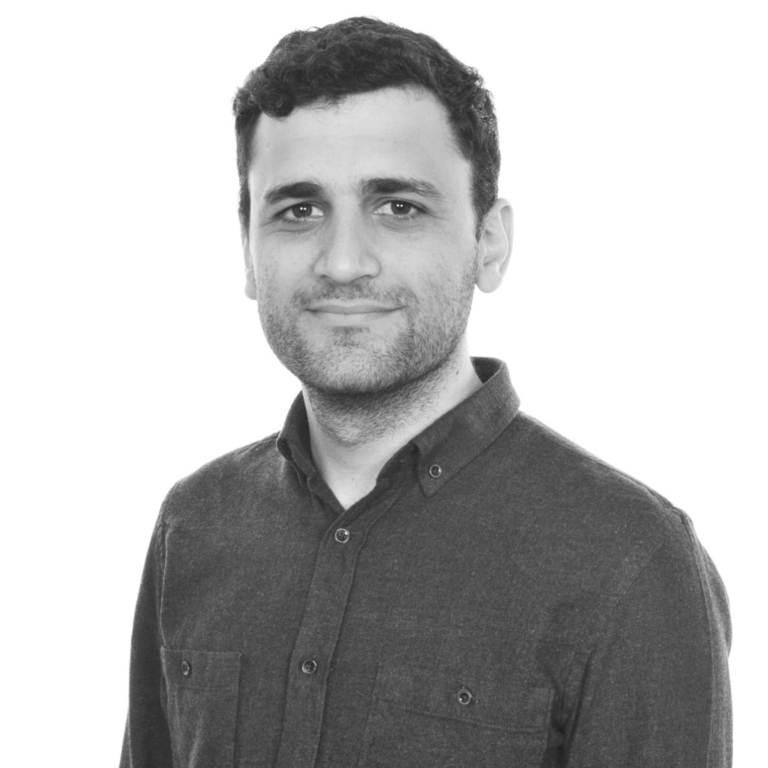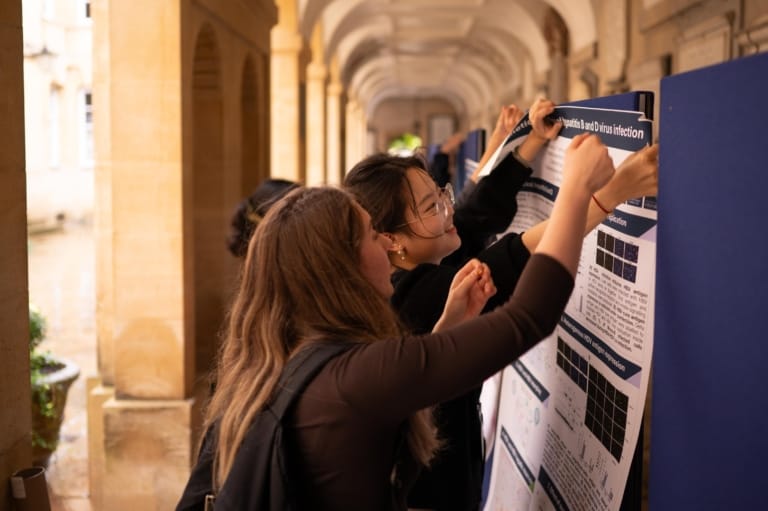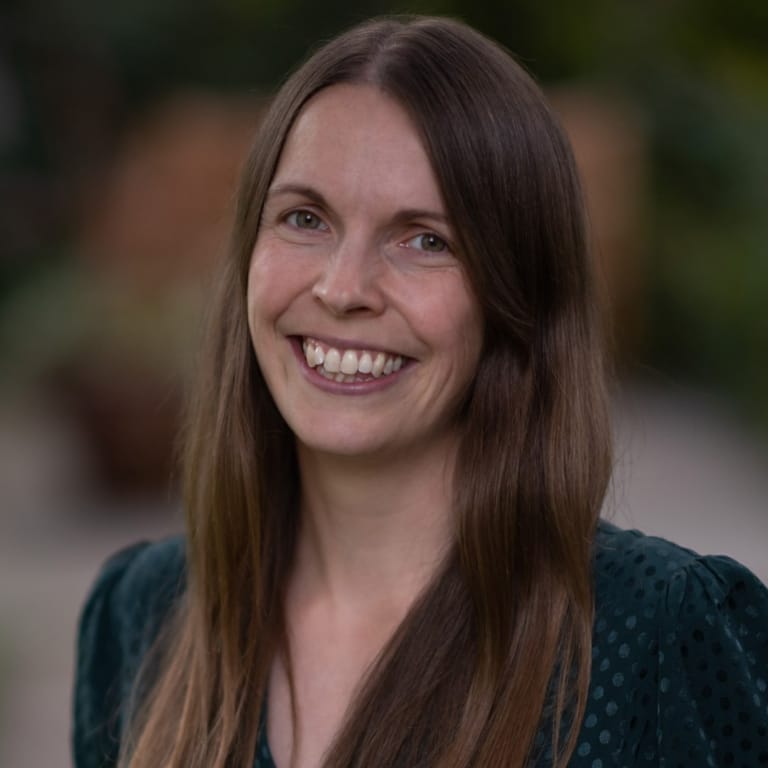Lister Fellows, friends and members of the committee met for two days of lectures, conversation and conviviality at Corpus Christi College, Oxford on September Thursday 7th and Friday 8th.
Lectures from Fellows and former Fellows
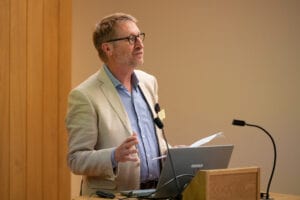
Proceedings began with a welcome from our Chair, John Iredale, who introduced the first speaker, former Lister Fellow Robin May of the University of Birmingham, Chief Scientific Advisor to the Food Standards Agency.
Robin’s talk focused on the immunomodulatory effects of Cryptococcus, a pathogen that can lurk in the lungs for years before proliferating to devastating effect in immunosuppressed patients.
Key to the pathogen’s success is the ancient but little-understood process of vomocytosis, where a macrophage “vomits” out the pathogen it has been attacking. Vomocytosis is modulated by inflammation, and forms part of a complex of interactions between pathogens and immune system that Robin and his team continue to explore.
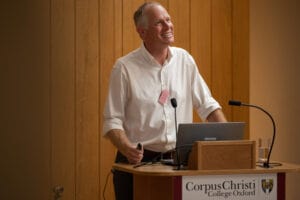
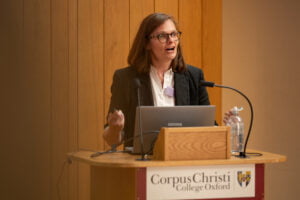
We then heard from 2020 Prize Winner Dr Rebecca Lawson, of the University of Cambridge. Becky’s work unites psychiatric diagnosis with computer modelling, which could formalise the classification of symptoms by mapping and analysing observations such as frequency of forgetting or prediction errors, building up a ‘fingerprint’ of cognitive traits. Becky and her team have identified biomarkers in infants which could enable neurodivergent children to be treated or supported throughout their lives, rather than presenting at a later stage after years of struggle.
After a tea and coffee break, the group returned to the auditorium to hear from 2022 Prize Winner Dr Anthony Khawaja, of University College London and Moorfields Eye Hospital who joined us via video. Anthony’s research focus is translating genomic discovery into clinical prediction tools for glaucoma. Anthony explained how the current understanding of glaucoma risk is based on big-picture statistics that miss some of the nuance in individual cases.
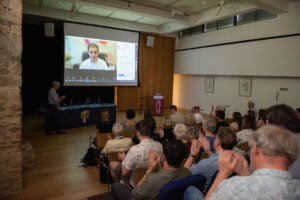

Combining genetic information with other biomarkers, Anthony has been able to trace the mechanisms through which glaucoma develops. He has created predictive tools which could allow healthcare professionals to tailor treatments and lifestyle changes to each patient depending on their screening results. Rounding off the afternoon’s talks was 2022 Prize Winner Dr Amanda Chaplin, of the University of Leicester. We previously talked with Amanda in-depth about her study of human DNA repair complexes using cryo-electron microscopy (cryo-EM). During her talk, Amanda shared more information about her methods and the ‘resolution revolution’ that detection technology and computation power have brought to microscopy though new methods like cryo-EM.

Thursday concluded with drinks, a buffet and a poster presentation from the Lister Summer Students, many of whom are just coming to the end of their summer placements with the Lister Fellows.

Friday’s talks kicked off with a lecture on macrophages, matrix and metazoan parasites from Professor Judi Allen of the University of Manchester, a member of the Lister Institute Scientific Committee. Judi introduced us to some of the parasitic helminth worms that elicit a ‘type 2’ immune response in their human hosts, which is fundamentally different to the ‘classical’ immune response. As well as fighting infection, a type 2 response limits damage to tissues by muting inflammation and strengthening a supportive structure called the extra-cellular matrix. But this mechanism is not straightforward, and paradoxically, can actually worsen the symptoms of some diseases.
2023 Fellows’ talks

Next came the first of the 2023 Lister Fellows’ talks, from Dr Fiona Whelan of the University of Nottingham.
Like several other 2023 Fellows, Fiona introduces a computational layer to traditional biomedical research. Using longitudinal samples from a group of cystic fibrosis patients, Fiona’s team found that their lung microbiota form a complex ecosystem. By mapping the genes within the bacterial groups, they were able to describe a ‘pangenome’ capturing the ecology of the lung microbiota. This knowledge could help create CF treatments that inhibit pathogenic strains of bacteria, rather than periodically dosing the whole ecosystem with antibiotics.

Dr Kirby Swatek of the University of Dundee took the podium to discuss his work on ubiquitin and ubiquitin-like proteins, specifically their irreversible inactivation. As their name suggests, ubiquitins are found in almost all eukaryotic tissues, where they play an important and complex signalling role.
Kirby and his team discovered a viral protease that can permanently deactivate ubiquitins and ubiquitin-like proteins. He described how he will use the Lister Prize funding to address unanswered questions like how ubiquitin deactivation affects organisms on a cellular level, whether it could act as a biomarker, and whether there are other similar proteases at work in disease-relevant areas of biology.

The next talk was from Dr Srikanth Ramaswamy of the University of Newcastle. Srikanth studies the role that neuromodulators – substances which influence how neurons function – play in shaping social interactions in the brains of humans and mice, and uses computer modelling and neurorobotics to supplement knowledge gained from experimental work. Srikanth plans to use the Lister Prize funding to build a deeper understanding of how serotonin and histamine interact in mammalian cognitive processes. This will enable him to build predictive models that will help scientists understand how these neuromodulators might function – or malfunction – in health and disease.

In the following talk, Dr Joana Neves of King’s College London introduced us to her work on the regulation of innate lymphoid cell differentiation and function in intestinal health and disease. Innate lymphoid cells (ILCs) are key components of a healthy gut, keeping epithelial tissue in good condition and supporting immune defences. In inflammatory bowel disease (IBD) though, certain ILCs can build up in the gut tissue and contribute to inflammation and even the development of fibrosis and cancer. Joana and her team explored how these unhelpful ILCs accumulate in the gut using organoids – tiny model ‘mini-guts’ made of living tissue in vitro.

Next, we welcomed Dr John Knight of the University of Manchester to the podium. John studies the way human proteins are built, or translated, from RNA ‘blueprints’, and how problems in this process can lead to disease. Translation is a highly-regulated, energy-hungry process that involves multiple steps – initiation, elongation and termination. John’s doctoral work explored the role of the elongation step in colorectal cancer, and established that suppressing or modulating it could have a valuable therapeutic role.

The final 2023 Fellows talk was from Dr Helen Weavers of the University of Bristol. Helen introduced her research on the role of immune system resilience in maintaining healthy tissues in later life. Our bodies survive and even thrive despite a lifetime of physical and chemical insults, and Helen’s interest lies in the biological mechanisms of repair, neutralisation or damage limitation that make this happen. These protective processes are also relevant in pathology, as disease can develop when they are disrupted.

A short talk followed from former Lister Fellow Dr Simon Bullock of the University of Cambridge. Simon founded the Microscopes 4 Schools project in 2011 with the support of the Lister Institute. The project’s aim is to spark scientific interest in children of primary school age, especially those with underprivileged or underrepresented backgrounds. It supplies children with digital microscope kits they can use to image and explore the natural world around them.
Special Lister Lecture

The sessions concluded with the Special Lister Lecture, delivered by Professor Dame Pam Shaw of the University of Sheffield, Director of the Sheffield Institute for Translational Neuroscience (SITraN). Pam’s talk was a moving story about the journey towards better outcomes for people living with MND, and the progress made to date in extending their life expectancy and improving their quality of life. Pam’s career mission is to improve patients’ symptoms while researching the causes of MND, which are complex and heterogeneous. A deeper understanding of MND’s genetic foundations is being translated into gene therapies, which are now entering clinical trials with some remarkable early results.
We celebrated in the evening with drinks on the college terrace and a dinner in the beautiful oak-panelled dining hall.




